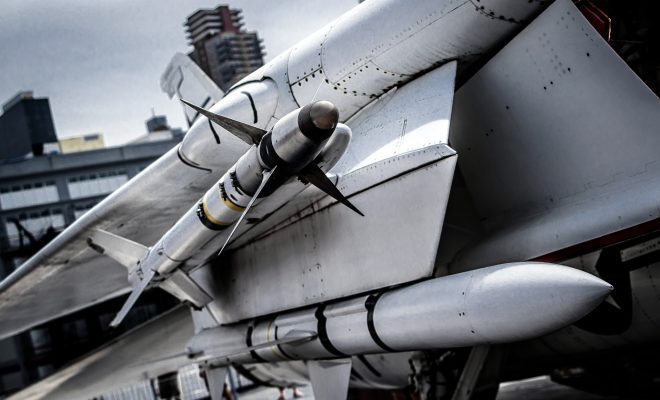 "US Army Rocket" Courtesy of [Marco Cortese via Flickr]
"US Army Rocket" Courtesy of [Marco Cortese via Flickr]
World
Despite Human Rights Disagreements, Obama Lifts Arms Embargo with Vietnam
In the same city where 20,000 tons of explosives rained down from American planes during Christmas 1972–killing more than 1,000 civilians–President Barack Obama stood in front of giant American and Vietnamese flags on Monday to announce the severing of a Cold War-era arms embargo between the U.S. and Vietnam. This is Obama’s first visit to the country, and the first leg of a trip in the Pacific.
At a news conference in Hanoi–the communist country’s northern capital on the banks of the Red River–Obama continued his pattern of deepening ties with longstanding U.S. adversaries, and of thawing relations with largely isolated communist regimes such as Cuba and Myanmar.
“The United States is fully lifting the ban on the sale of military equipment to Vietnam that has been in place for some 50 years,” Obama said to a gaggle of Vietnamese and foreign press as he insisted the ban had nothing to do with China. “It was based on our desire to complete what has been a lengthy process of moving toward normalization with Vietnam.”
Critics of the announcement however, namely human rights organizations that view Vietnam as a brutal regime with a horrendous human rights record, contend the move will cede leverage in negotiating with the Vietnamese to reel back their abuses: including jailing journalists, beating dissidents, and maintaining over 100 known political prisoners (Human Rights Watch counts 104, though it acknowledges there are most likely many more).
“The only people who would be happy [with the lifting of the ban] is the Vietnamese government, because [Obama] didn’t address human rights except in a boiler plate paragraph with no names, places or dates, no people, no sense of urgency,” said Brad Adams, Asia Director at Human Rights Watch (HRW) in an interview with Law Street.
According to Adams, the speech occurred on a day that served as a microcosm of Vietnam’s concerning behavior: parliamentary elections (“a rubber stamp affair,” Adams called them) were held as dissidents were rounded up. Obama did not address either in his announcement.
The full lifting of the embargo–which was partially lifted in 2014–is the final step in normalizing relations with the Southeast Asian nation, and in removing a “lingering vestige of the Cold War,” said Obama. Earlier in the trip, Obama made other moves to strengthen ties between his government and that of Tran Dai Quang, Vietnam’s president. Visa restrictions for travelers to either country will be eased, the Peace Corps will station volunteers in the country to teach English, and both Obama and Quang reiterated their commitment to the Trans-Pacific Partnership trade deal, or TPP, which is currently stalled in Congress and has failed to obtain the concrete support of any of the three remaining presidential nominees.
Obama’s stated goal in easing arms sales to Vietnam is to allow the country to defend itself amid increasingly volatile times in the region. Its powerful neighbor to the north–China–has shown signs of aggression in a territorial dispute in the South China Sea, where Vietnam, China, Taiwan, Malaysia, Brunei, and the Philippines jostle over who has the right to the Spratly Islands. In recent months, China has intensified its naval force in the region and has been hard at work in building an island in the hopes of legitimizing its claim.
![Disputes over territory in the South China Sea has led to increased tension between China and much of Southeast Asia. [Image courtesy of deedavee easyflow via Flickr]](http://lawstreetmedia.com/wp-content/uploads/14221014032_08e302ab62_h-230x250.jpg)
Disputes over territory in the South China Sea has led to increased tension between China and much of Southeast Asia. Image courtesy of [deedavee easyflow via Flickr]
Though China is publicly supportive of the dissolution of the half century old embargo (officials reportedly hope it will lead to “normal and friendly” relations), a commentary published in the state-run Xinhua News Agency on Sunday hinted at what is perhaps its unofficial, internal view of U.S.-Vietnam relations.
“As a habitual wave-maker in the Asia-Pacific, the United States has shown no restraint in meddling in regional situation, which is evidenced by its relentless moves to disturb peace in the South China Sea,” wrote Xinhua contributor Sun Ding. On the potential embargo lift, which at the time of publishing had not been announced: “The calculating move will serve only Washington’s own strategic purposes as the United States seeks a rebalance in the Asia-Pacific.”
The White House and Vietnam’s government released a joint statement Monday afternoon in regards to the partnership between the two countries, with a section highlighting “promoting human rights and legal reform”:
The United States welcomed Vietnam’s ongoing efforts in improving its legal system and undertaking legal reform in order to better guarantee the human rights and fundamental freedoms for everyone in accordance with the 2013 Constitution.
But Adams isn’t convinced that Vietnam is doing anything concrete in regards to safeguarding human rights. Even if the Vietnamese government enacts law changes, it does so to benefit those in power, he said, not for the good of the people. He’s seen mixed reactions from the blogosphere in Vietnam–human rights organizations’ window into the country because they are not allowed on the ground–in regards to Obama’s speech.
Nationalist fervor is gripping Vietnam at the moment, Adams said, and so the people who are focused on the alleged threat from China are happy the embargo was lifted, and progressive liberals in the country are happy with the move as well. Others, he said, think it should have been lifted but with concessions. And while he noted this episode as being entirely about the perceived threat from China, Adams was disappointed in what he saw as a blown opportunity.
“When you have leverage, to just throw it away is unacceptable,” he said.








Comments